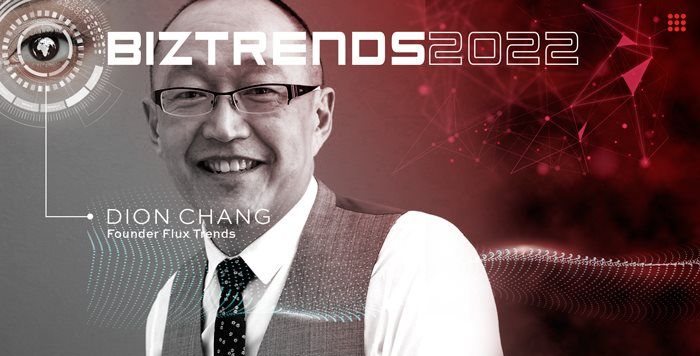Marketing & Media trends
Industry trends
BizTrends Sponsors
Trending


 Clicks to sell drugmaker after court rulingNelson Banya
Clicks to sell drugmaker after court rulingNelson Banya


#BizTrends2022: This state we're in is quite bizarre

Prior to the Covid-19 pandemic in early 2020, we were already operating in fast-moving and uncertain times. Chang describes the theme for 2022 as the Century Tango, which he explains as a slow-slow, quick-quick, slow momentun as we navigate into a post-pandemic world.
Speaking at Bizcommunity’s BizTrends 02.02.2022 100% Trends virtual event, which took place online on Wednesday 2 February 2022, Chang provided an executive snapshot of where we going in 2022 and beyond and includes a bellwether, a real-life indicator of these trends taking shape.
For context, Chang refers to "worry burnout". We've been in various stages of lockdown for the past two years and a lot of psychologists say that we are suffering from "worry burnout", a learned helplessness that is a sense of overwhelming powerlessness after trauma, whether you are afraid of Covid-19, or have lost a loved one as a result of coronavirus. Chang references psychologist Bernard Golden who says that our "threat systems are at a heightened level".
Chang cautions that we need to be mindful of a re-entry etiquette - we need to be nice to people as it's going to be a tough year to readjust to a 'better normal'.
This presentation follows the acronym TRENDS: T for Technology, R for Retail & Marketing, E for Economy, N for the natural world, D for Diplomacy and S for Social and cultural traits.
T - Technology trends
In the first year of lockdowns in 2020 going through 2021, technological concepts like robotics have really come to the fore. Chang refers to the last couple of months, as "rush hour in the metaverse".
Currently, we're seeing a surge of virtual traffic jams as brands enter into the metaverse. Big American brands such as Walmart are competing with the likes of global brands such as Meta (Facebook), Nike, Ralph Lauren and Disney and these brands are causing virtual traffic jams, as they vie for our attention.
Financial companies are also jumping on the bandwagon. SoftBank invested $150m in a South Korean metaverse platform called Zepeto which carries clothing accessories from designer brands, like Gucci, Dior and Ralph Lauren.
Governments are also entering the metaverse. It's been reported that there are two countries that have stepped into the metaverse. Barbados became the first country to legally declare digital real estate as sovereign land with the establishment of a metaverse embassy.
Bellwether: A restaurant in Florida, because of labour shortages, started employing more service/hospitality cobots and discovered that the waiters' tips increased showing that when automation arrives, you can do more human things
R- Retail & Marketing
We saw the rise of a contactless economy during the pandemic. South Korea has a government policy that aims for what they're calling an untapped society. This means no human contact with anybody. While this scares a lot of people, we are starting to see that this is quite successful.
While we are moving away from human contact, we are also moving away from real animal protein. The trend of plant-based foods or lab-grown proteins has been bubbling up for quite a while. It's not tipped over into a commercial aspect yet until 2022. KFC in America is the first multinational fast food brand to release beyond fried chicken throughout the US. That's an enormous market and they've been trialling it for the past two years.
On the other side, in terms of lab-based protein, technology has been accelerated quite fast. Israeli company, Future Meat, has in the last 10 months brought the price of lab-grown protein from $7.50 down to $1.70. That's really significant because it means that once the price goes down there can be a more commercialised way of looking at plant-based proteins.
South Africa is not far behind as Mzanzi Meat Company is producing lab-grown meat, making this our sort of pioneer in South Africa,
He uses TikTok as an example, after they announced that they are going to go into the food and food delivery sector, by partnering with Virtual Dining Concepts.
What they're doing is that if some food or a strange recipe goes viral on TikTok, that determines the menu and what they will be serving. So be careful of what you put on TikTok as it could end up on the menu.
Bellwether: Something that has scaled so fast in the last 18 months, started with big brands like Balenciaga and Gucci creating little miniature avatar skins for gamers to use in their games. That morphed very quickly into a digital fashion category. At the tail end of 2021, we saw quite a few digital-only fashion brands being launched at fashion weeks around the world.
E-Economy
Supply chains are still in a mess. If you are a fan of a certain brand of breakfast cereal, you might have realised that for the past few months, the shelves have been completely empty.
What's significant is that Japan has appointed a Minister of Economic Security to tackle the disruption of supply chain. Many companies are struggling with this, and as consumers, we are bearing the brunt of 'shrinkflation'. This means we are getting smaller amounts, smaller sizing and lesser amounts of what's in the packaging, but we're being charged the same or even more.
Chang notes that we are also starting to see the disappearance of the middle class, which he calls 'the middle class mirage' in South Africa. A University of Cape Town and Liberty Institute report published at the end of 2020 shows that just between 2017 and June 2020 we lost about 55% of what we consider to be the middle class.
A new carbon economy is starting to grow., with more carbon footprint labels on products so you can start tracking your CO2 emissions. That's only one category of a carbon economy. The other is carbon capturing. Chang makes an example of a fashion brand that actually captured CO2 and it looked like sort of old coal dust and they used it to actually stitch a logo into garments.
Bellwether: Virtual Realty is really going through the roof. Decentraland made a record with the first person to spend $2.5m on a piece of virtual property in Decentraland. Somebody found out that Snoop Dogg owned property in Decentraland and paid almost half a million dollars to live next to Snoop Dogg because your neighbours in a virtual property world are as important as the physical one.
N-Nature
The natural world is quite a sad pillar because chemical pollution has now passed the safe limit for humanity - we're at a tipping point.
Climate change and sustainability really came to the fore during the pandemic. The language used in publications has changed all over the world from climate change to climate catastrophe or climate emergency as this is a threat to national security.
Like the lockdowns we experience in the pandemic, there is also climate lockdowns and these are associated with pollution.
How is pollution linked to climate change? In areas of high pressure, if the climate or the weather patterns change, those areas of high pressure, don't bring the winds to blow away the pollution. We have seen climate lockdowns in New Delhi, India. Schools were told to shut up for an entire week and construction workers that worked outdoors were banned from working for three days. And it was a compulsory work from home lockdown because of pollution.
There is a new category called climatarianism. These are people who eat or make food choices that specifically reduce their carbon footprint. This is emerging as a new lifestyle,
Bellwether: Planet Earth is getting a black box, just like in aviation and is recording what is happening to it. If anything tragic happens, some other alien life-form can come to us and say, okay, we know what they did, this primitive life-form didn't look after themselves, their planet and this is what happened. This is situated in Tasmania and will be completed in the first half of 2022.
D - Diplomacy
Before the pandemic hit, we themed the state we're in then as the politics of rage and polarisation and we've seen how that has completely escalated in the pandemic.
The pandemic is one of the most divisive and polarising events that have happened to humanity - vaxxes, anti-vaxxers, believers, non-believers - and that's why we are angrier.
It's also a good idea to look at warfare in this digital era as there are different types of warfare. Something that is brewing on the Russia-Ukraine border, and guerrilla warfare within Ethiopia; that's military warfare. There's a concept of Gray Zone Warfare already and now that's moving to hybrid warfare.
Trade warfare has been going on for quite some time, as geopolitical or cold wars, and these are escalating.
S - Socio-cultural
We have more single people in the world as women are not marrying and having children. In certain countries, where there is an older population, such as China, a demographic crisis is unfolding as they start to look at manufacturing adult diapers.
The African continent is a young Gen-Z continent and we need to leverage that.
In South Africa, we are hearing disturbing reports of people who have graduated and have a degree but have left the metropolitan areas to go to smaller towns in rural areas.
Bellwether: If everything is getting too much for you, you can end it all using the assisted suicide pod, which was launched just at the end of 2019 in Venice. It's situated in Switzerland, where self-euthanasia is legal. Basically, you get in the pod, press the button and the pod gets flooded with nitrogen. You have a little bit of a euphoric high and then you drift off into the ether. It's starting to kind of make waves around the world.
Things are looking quite bizarre as we are having to adapt to a fast-paced world that is ever-changing.
Dion Chang is the founder of executive trend consultancy Flux Trends, one of South Africa’s most respected trend analysts, lecturer, author and columnist.
Follow @dionchang @fluxtrends.












